INFJ, INFP, ENFJ, and ENFJ Villains
Every story needs a good villain. And as much as we’d like to think that we’re rooting for the good guy in a movie, there are plenty of times when we have to secretly admire the bad guys’ intelligence, wit, and cunning. This isn’t to say we should all be bad guys, or admire evil people, but there’s something to be said about a well-written villain. For fun I decided I would try to figure out which villain best matched each personality type. I got some help from other bloggers and Myers-Briggs enthusiasts and I’m finally ready to get started on part one: the dreamers.
Not sure what your personality type is? Take our new personality questionnaire here. Or you can take the official MBTI® here.
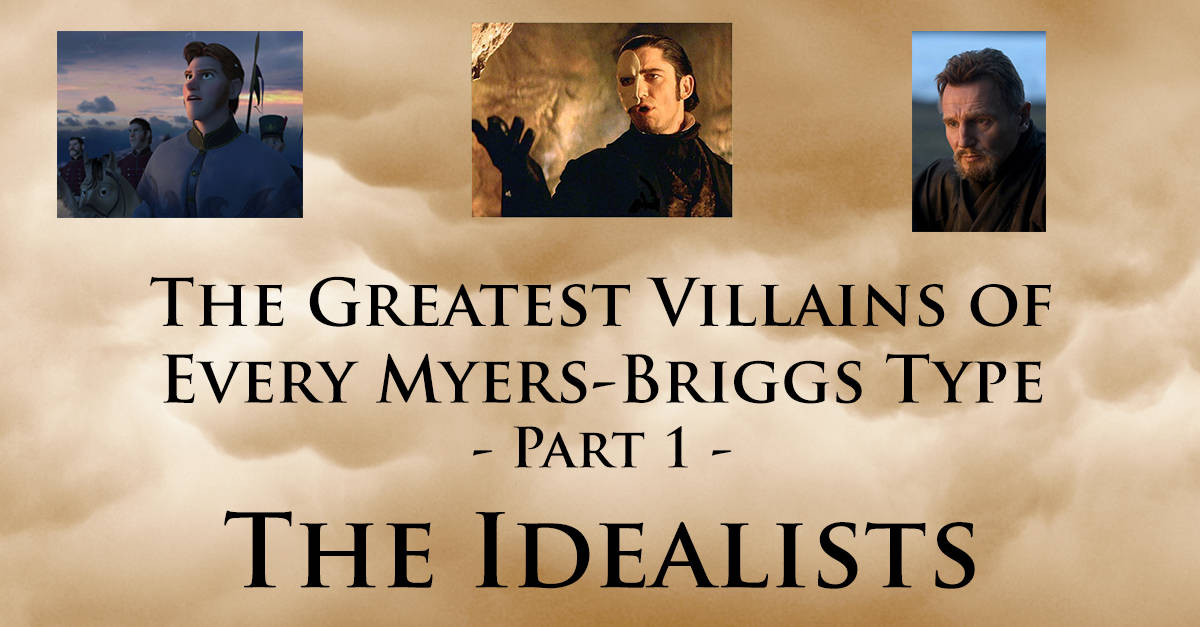
Want to find the NT villains? Click Here
SP villains? Click Here
SJ villains? Click Here
Dreamers (NF types) are driven to understand people, and naturally have an intense desire to serve humanity. They are deeply aware of others’ feelings, and it is very hard for them to pull off evil schemes without struggling with their intense desire to help humanity instead of hurt it. This is why most NF villains have a twisted, warped sense of justice and a misguided strategy of “helping” the world. The writer at the Zombies Ruin Everything web site put it well when he said “NFs as villains are more likely to fall on the side of an evil method rather than a terrible goal and this can be difficult for a writer to create without having you lose interest in the character entirely.” This may be why we see very few idealists in villainous roles in cinema. They are out there though – and I’m bringing them to you in this post. Feel free to let me know what you think in the comments or on my facebook page.
INFJ – R’As Al Ghul
R’As Al Ghul is singularly focused on his vision for the world and how to make it a utopia. This idealistic vision, this corruption-free world is something that all INFJs hunger for. However, R’As has twisted his mind so much that he believes the only way he can create this world is through emotional manipulation or fear. He isn’t after power or having a name for himself, he truly believes the only way to a balanced world is through the destruction of the people he deems evil. Unhealthy/imbalanced INFJs can be among the most destructive because they tend to have such a singular focus and such a power to manipulate and coerce people into following along with them in their vision.
R’As has an uncanny insight into Bruce Wayne. This insight into people’s feelings and motives is something that INFJs are famous for.
“What you really fear is inside yourself. You fear your own power. You fear your anger, the drive to do great or terrible things.”
“But I know the rage that drives you. That impossible anger strangling the grief, until the memory of your loved one is just poison in your veins. And one day, you catch yourself wishing the person you loved had never existed, so you would be spared your pain.”
INFJs can be master manipulators if they develop a false sense of moral justice. But most often, INFJ villains believe what they are doing is for the good of humanity.
More here on R’As Al Ghul
INFP – The Phantom from The Phantom of the Opera
Erik (The Phantom) is driven by his desire to be loved by Christine. Everything he does stems from this longing. He infuses his words with incredible passion and depth of feeling, wanting more than anything to find peace with the one woman he believes holds the key to his happiness. His focus isn’t power and world-domination, but to have his feelings of adoration met. His focus is subjective and not broad like a Fe-users would be. He is very immersed in his own feelings of inadequacy and longing (one example of unhealthy Fi).
“If I am the phantom, it is because man’s hatred has made me so. If I am to be saved, it is because your love redeems me.”
“All I wanted was to be loved for myself. If you loved me I should be as gentle as a lamb; and you could do anything with me that you pleased.”
Erik is very idealistic in his love for Christine, and extremely imaginative in the way he lives his life. He immersed himself in a plethora of skills including singing, songwriting, performing illusions and magic tricks, and even becoming a ventriloquist. Much of this isn’t explored in the movie adaptation of Phantom, but if you read the book you see more of his creative side. He becomes so attached to his idealistic vision of Christine and his longing for her, that he traps himself inside a fantasy world where she is his bride. His belief in the fantasy world he has created and his intense imagination are all very common among unhealthy INFPs. For an imbalanced INFP, they may feel like discarding the natural world for their imaginary fantasy world because the real world is too flawed.
When under stress, Erik resorts to harsh accusations, brutality, and organizing others to accomplish his goals and manipulating them to do his bidding. This is an example of unhealthy Extraverted Thinking (Te). INFPs when exposed to chronic stress and an unhealthy lifestyle can fall into the grip of Te, which is what the Phantom is doing in various parts of the book. This is why, I believe, many people mistype Erik as an INTJ instead of an INFP, because they see the Te qualities without taking into account that Erik is at an unhealthy/imbalanced state.
ENFJ – Hans from Frozen
Hans easily and quickly adapts and responds to the emotions and feelings of those around him. He is excellent with his words and expressions, and can easily and inconspicuously manipulate people without them knowing it. People with very strong Extraverted Feeling (Fe) can be incredible manipulators; making people feel at ease and comfortable, even appearing self-deprecating themselves, to ultimately sway someone’s mind or have an influence.
Hans combines his Fe with strong introverted intuition – a function that enables him to come up with an intelligent and complex future plan of how he will become king. It’s a long-term plan that many could not have pulled off, but he did it (almost) perfectly. His inferior Introverted Thinking shows up at the end when he exposes his true feelings about Anna and has some brutally honest criticism to make about her neediness.
“As heir, Elsa was preferable, of course, but no one was getting anywhere with her. But you…you were so desperate for love, you were willing to marry me, just like that! I figured after we married, I’d have to stage a little accident for Elsa. But then she doomed herself, and you were dumb enough to go after her.”
ENFP – Megamind
Okay, it took me forever to find an ENFP villain. You ENFPs are just too friendly!! I finally settled on this guy. Why? It seems like many personality enthusiasts saw a similarity between him and an ENFP personality type, so I decided to research it myself and I agreed that ENFP was his best fit (I juggled between ENFP and ENTP A LOT).
Megamind is constantly coming up with new ideas and possibilities, much like ENFPs do. He’s driven by curiosity, optimism, and the quest for excitement. He loathes boredom and the mundane, everyday details of life – as ENFPs often do. You can see his strong Introverted Feeling when it comes to the decisions he makes in life. He makes almost all of his decisions based on emotional reactions – blowing up a statue because it brings back too many painful memories, becoming a super-villain because he’s faced so much rejection in life.
“No matter how hard I tried, I was always the odd man out, the last one picked, the screw-up, the black sheep…the bad boy. Was this my destiny?”
Megamind’s inferior Si (introverted Sensing) shows up when he gets depressed. Anytime he gets depressed or down, it usually has something to do with a past memory. After he defeats Metro Man, he starts longing for the familiar dynamics of their past relationship. Overall, as much as I could find, he is the best example of an ENFP out there.
I almost went with Tyler Durden for an ENFP villain, but I ended up thinking he was either ENTP or ESTP (not sure yet!).
Find out more about your personality type in our eBook, Discovering You: Unlocking the Power of Personality Type.
That’s all for now! More to come soon!
My next installment will deal with the Rational (NT) Villains. I’ve got my work cut out for me! Do you have any suggestions or disagreements? Let me know (nicely please) in the comments!


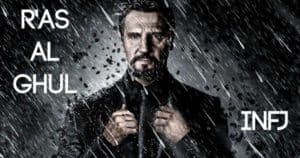
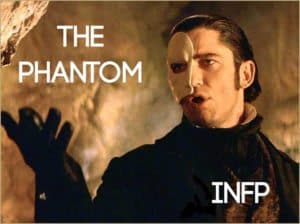
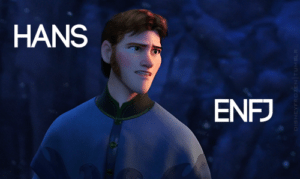
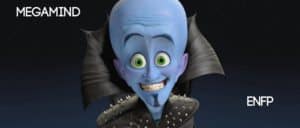

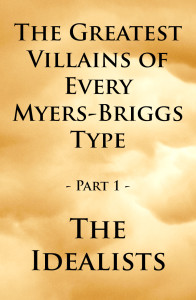
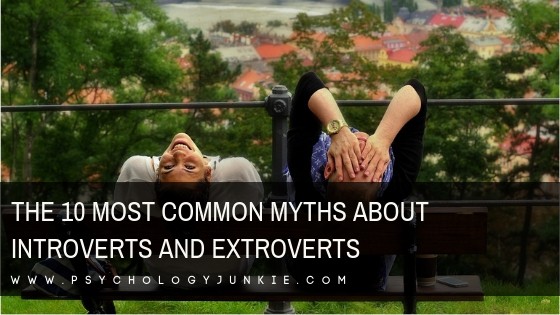
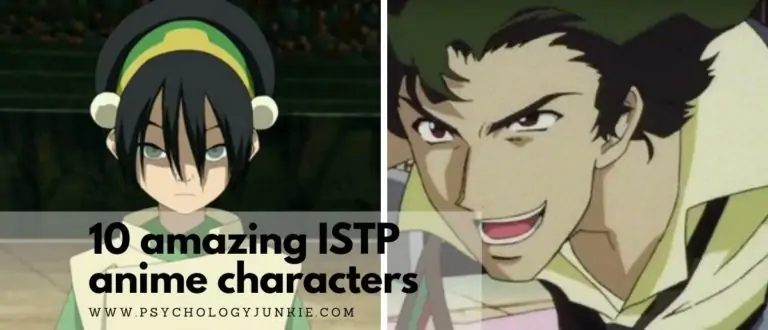
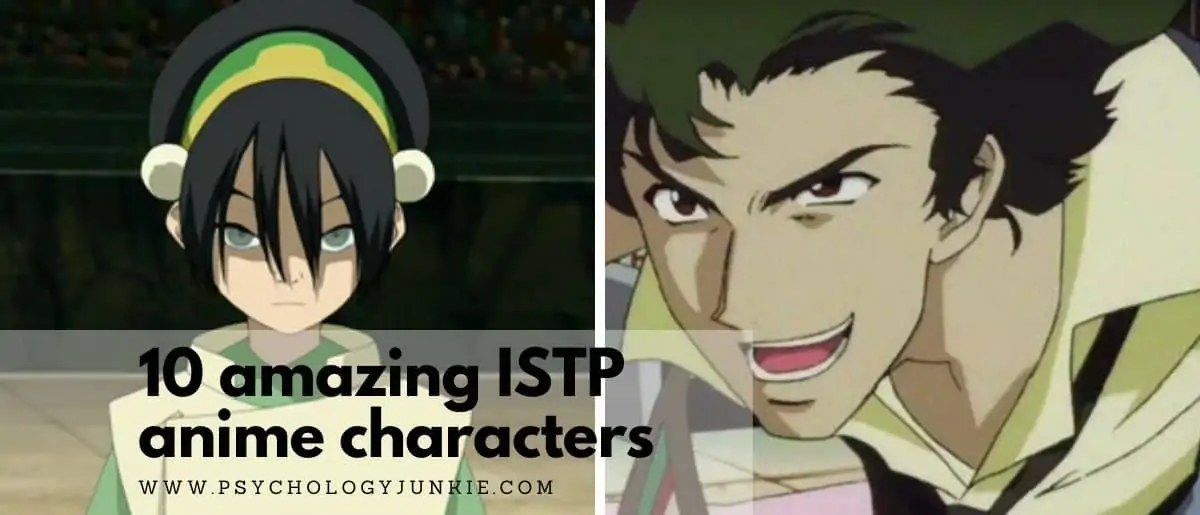
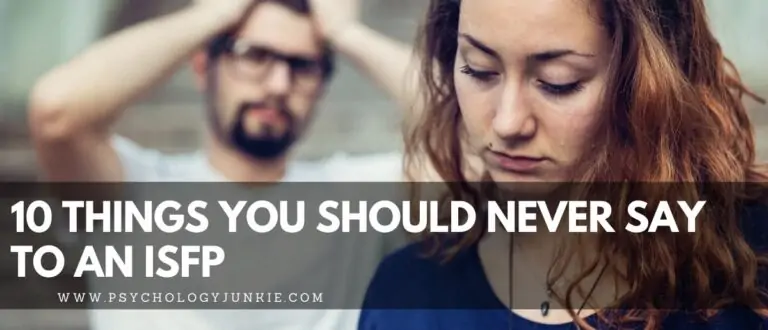
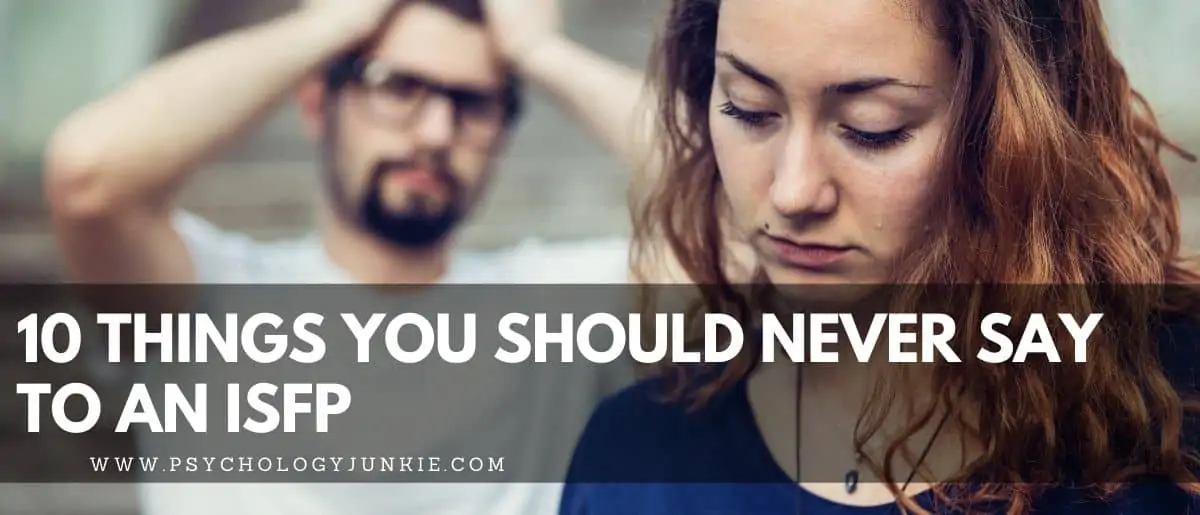


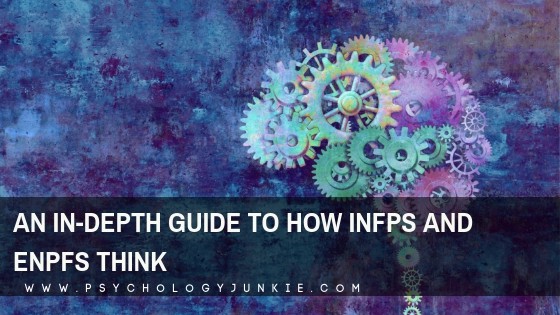
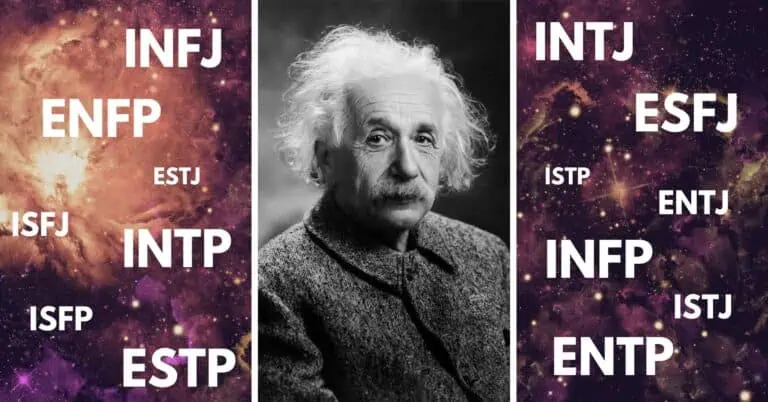
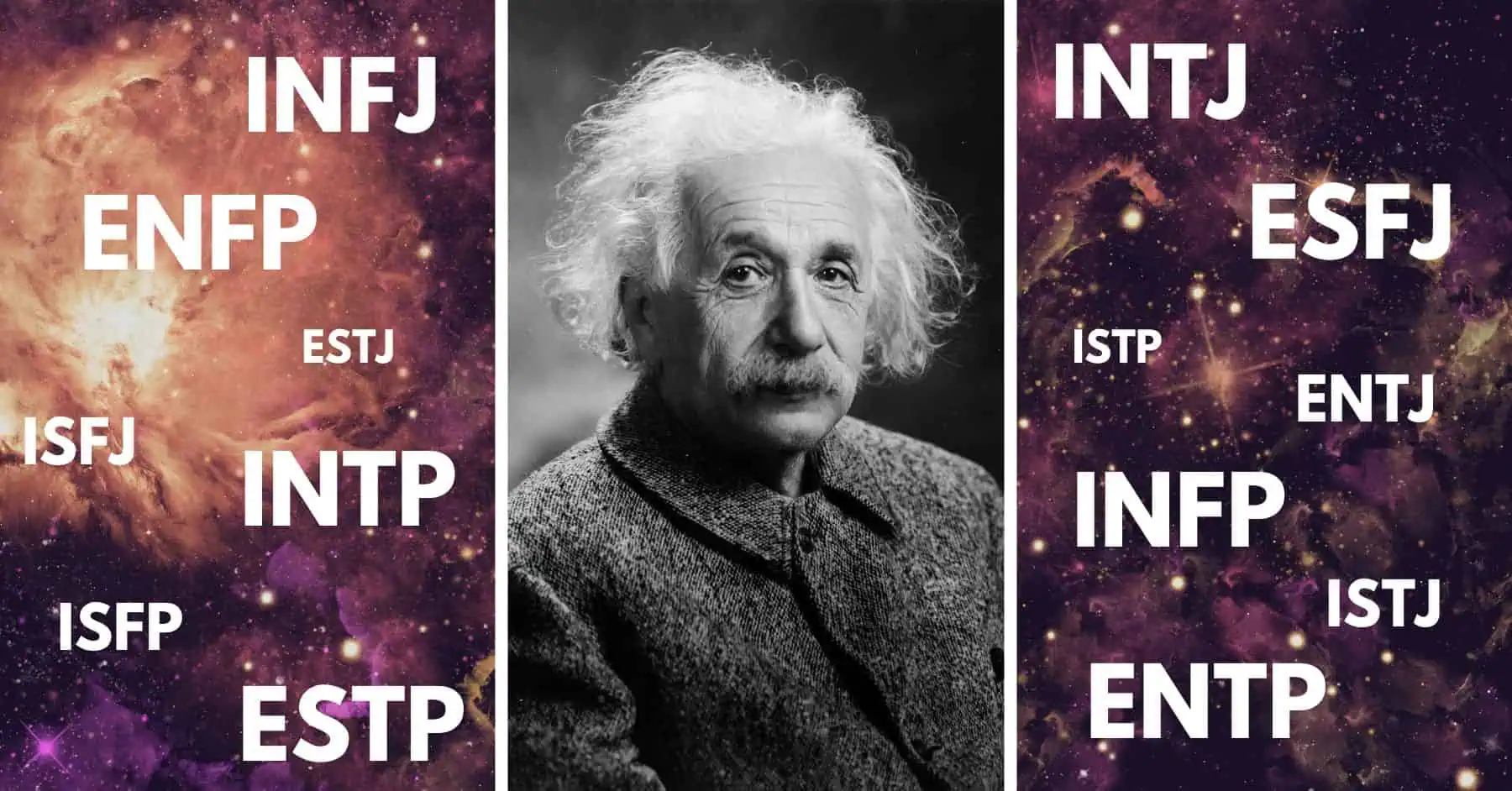
Please include Loki as one of your villains !
Tyler Durden is an ENTP or ESTP, I agree. You can see the difference between him and TDK’s Joker. Tyler is rational and think in structures. (this or that doesn’t work) He’s definitely a T.
Thank you for your input on this! I appreciate it!
I think the Joker from The Dark Knight might be more ENFP than ENTP. His “logic” is basically that everyone’s corruptable and he tries as long as he manages to do that to someone. He cares about authenticity and that’s more of a ENFP trait than ENTP.
The other depictions of Joker are more an ENTP, I agree. But Dark Knight’s Joker is different in my oponion.
I just love this post. The entire blog. Thank you. So much.
I’m so glad you enjoyed it! Thank you for the kind words, they’re very encouraging 🙂
Hi! You said comment and I will!
ENFP, when I read villain I said: yes! Finally a real villain to show ENFPs aren’t just happy unicorn but can be twist as evil and… I find megamind. Yeah I kinda like him but you know… I wanted a real, dramatic, megalomaniac villain!… I guess we ENFP aren’t really suit for being the evil one, we just Te bitch slap once or twice, no more than that.
In fact usually in cinema ENFP are the protagonist, not the evil mind, and ENFP villain are just no really villains, but just very very twisted. But I’d like to have found a merciless villain for once!
Some i can suggest are the Cheshire cat of Alice in wonderland, which is very twisted in nor a good way nor in a bad way, and Obito from Naruto, which is a perfect example of and ENFP gone bad.
I have one to say for harley quinn, which you typed differently. If we would speak of the “canon” Harley Quinn, the one from comic and cartoon, she is definitely a sensor, as you have typed if I remember correctly, but I think that in just Suicide Squad she is more likely intuitive. In fact I think she just fake a lot, in charge of being believed madder than she really is. She wanna be carefree of rules, but when joker drive under water she is concerned (Mr J I can’t swim!) and she is desperate as Mr J died, but she hides that pretty quickly. She is smart and we see her plotting her escape more than once, as in the elevator scene; everything she does has more likely a reason afterwards and she is very creative: in a bang she s able to fund out a way to take down the Enchantress choosing from the possibilities she has the best one. She does fake a lot and if she were an extrovert sensor gone crazy I think she couldn’t to come out with just plans and keep it for herself. So I think she is more likely an extroverted intuitive, at least in 2016 film.
I think Master Chen from the TV series Ninjago is an ENFP. My siblings are fans of the series and one think that strikes them is how similar he is to me (I am an ENFP myself), from his excitement over ridiculous things like the buttons on his chair, his tendency to daydream and space out and reluctance to return to the real world when his second in command, Clouse, brings an urgent matter to discuss to his absorption of his own achievements and interests (in contrast to being focused on others achievements and wanting to bring them down).
The Chen mini movies are especially demonstrative of his Ne nature which shows him behind the mask of the evil overlord and how he spends his days hidden from the rest of the world. They definitely, almost exactly, reflect my more mischievous nature.
I have a nice idea for an ENFP-A villain from a book: Sam Chase from the children’s time-travel series The Missing by Margaret Peterson Haddix. He seems like an ENTP-A when you first meet him (I am an ENTP-T myself) but when you get to the last book of the series, he reveals his Feeling trait. All of his devious decisions in the earlier books were due to emotional impulse, he admits. In these books, this character tried to create his own alternate dimension of time. Most of the protagonists honestly thought that this was all for the “sheer joy of it”; but in private, he tells one of the main protagonists that he struggled as a child and wished to create a dimension where everyone could be happy and be able to control their lives and their fates. He wanted to create a world better than the reality he was in. Like an _NF_ , he dreams for a better world. Unfortunately, like a ___P-A, he does not plan or consider the future, but relies on spontaneity. In the process of trying to create an alternate dimension, he abandons his ISTJ-T employer who he was (formerly) loyal to, changes his name to Second Chance, scares a bunch of kids to death, locks a few people in the year 1600 using time-travel, and kills a sailor who did nothing. He makes a lot of bad decisions and is feared to be one of the greatest time villains ever; but on the inside, it’s just the feeling of desire (oh gosh now I have the U2 song stuck in my head). Also, his Extroversion, Intuitive, and Perceiving traits are pretty obvious from the first time you meet him. He is not a bad communicator at all, and pretty philosophical and not afraid to express. He would be an absolute loon to all y’all _S_Js, for he is a big rule-breaker and extremely energetic. He is among my favorite villains of all time because of these traits and also for the fact that he, just like many other ENFPs, defy Myers-Briggs stereotypes. He is not all sunshine and rainbows like the ENFPs are stereotyped to be; rather, his motto is “life sucks, let’s make it better” as well as “be as dark and creepy as you need to for you to achieve utopia”. You can also see his Assertive trait in the way that he is always calm in most situations and has way, way, WAY too much confidence in his intuition. Here are my thoughts, and you can have yours. ^_^
I agree as an ENFP that Mastermind is a choice that is too reflective of stereotypical happy-go-lucky/zany depictions of ENFP. I like your original hunch of Tyler Durden, mostly because he is so *convicted* – he really believes in what he’s doing, and sees himself helping and freeing people from the oppressive routines and rules they have gotten themselves into – freedom and authenticity are big for ENFPs. He is also super charismatic, even when saying horrible truths that people would rather not hear – I think being like-ably serious is another thread in the ENFP constellation. And – to top it all off – he has completely sublimated his depressive, inactive self into another person (forgetting the main character alter-ego’s name), and don’t all ENFPs have a tendancy towards a public and a private face? Usually an actor and a recluse in one person
Fidel Castro was ENFP
Do not include “every” in your pathetic article’s title if you only include 4 out of 16. You MORON.
If you read carefully, you will find a ‘part 1’ and idealist 🙂
maybe you should read the article more carefully until you insult someone, because now you look like a ”moron”…. lol
Robespierre in most historical fiction portrayals of the French Revolution is INFJ.
Surprisingly the villain in the Cowboy Bebop movie, Vincent, is probably an INFJ villain. Actually, typically, most terrorist characters who believe what they’re saying are. You know the villain speech where the villain’s describing their perfect world, and it’s usually achieved without caring how many corpses their must be in the approach to it and either the vision itself is flawed or the method is so horrific that it makes getting there impossible to anyone with any morals and ability to see the world as it is. And it typically ends with the main characters saying “you’re insane” or something like that. Yeah. Chances are that’s an INFJ villain speech.
Nice list,
I’d definitely have Harley Quinn for ENFP as a fictional representation of the darker side of that personality group
I love your analysis on Erik! I too had mistyped him as an INTJ, but your explanation for INFP makes a valid point.